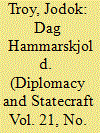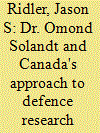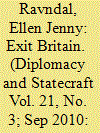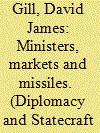|
|
|
Sort Order |
|
|
|
Items / Page
|
|
|
|
|
|
|
| Srl | Item |
| 1 |
ID:
099060


|
|
|
|
|
| Publication |
2010.
|
| Summary/Abstract |
The United Nation's secretary-general from 1953 to 1961, Dag Hammarskold , whose spiritual beliefs influenced his political activity, was searching for universality and solidarity as written in the charter of the UN. While in office, Hammarskold was able to unite personal belief and political rationale. This is the main reason he became a respected and true international civil servant. Hammarskjold was neither a pure idealist nor a pure realist. This article examines the moral but not moralistic life and legacy of Hammarskjold who united mystics and realistic political engagement. In doing so it draws on the lessons learned from a "practical mystical" and international civil servant. This is chiefly done by using the English School approach of international relations theory while at same time pointing out the impact of positive mimesis. By devoting his private life to God, Hammarskjold was able to devote his political life to the UN.
|
|
|
|
|
|
|
|
|
|
|
|
|
|
|
|
| 2 |
ID:
099058


|
|
|
|
|
| Publication |
2010.
|
| Summary/Abstract |
During the early Cold War, Dr. Omond Solandt became Canada's leading defence research diplomat. As Chairman of the newly created Defence Research Board, Canada's first peacetime defence research organisation, Solandt established strong ties with Canada's senior allies, Great Britain and the United States, in the realm of military science and technology. His goal was to harmonise Canada's defence research agenda within this informal science alliance and to gain access to Allied scientific knowledge and technology. Solandt's efforts in maintaining strong and co-operative relations with London and Washington are examined, shedding light on the personal nature of Canada's efforts in the realm of defence research diplomacy, including within the controversial realms of biological warfare.
|
|
|
|
|
|
|
|
|
|
|
|
|
|
|
|
| 3 |
ID:
099059


|
|
|
|
|
| Publication |
2010.
|
| Summary/Abstract |
The British decision to withdraw from the Palestine mandate in 1947-1948 may at first glance appear contradictory to British strategic interests. The Middle East and Palestine were vital to Britain's Cold War strategy, and its government repeatedly stated the need for a continued British presence in the region to prevent Soviet expansion. Why then withdraw from Palestine just as the Cold War started? The traditional explanation is that Britain withdrew because of economic exhaustion and its inability to remain a great power. But this article shows that economic and strategic considerations both contributed to the decision to withdraw. Britain's involvement in Palestine threatened to undermine its relations with the independent Arab states, and the decision to withdraw from Palestine was therefore taken in the hope that this would secure Britain's position in the rest of the Middle East.
|
|
|
|
|
|
|
|
|
|
|
|
|
|
|
|
| 4 |
ID:
099063


|
|
|
|
|
| Publication |
2010.
|
| Summary/Abstract |
This article challenges the almost universal consensus that post-Cold War neoconservative foreign policy has been characterised by the objective of "exporting democracy" abroad for strategic or moral reasons or both. Instead, the article contends that the touchstone of neoconservatism was the attempt to preserve America's so-called "unipolar moment"-its apparent position as the single pole of power in every region of the world. Moving beyond the abstract and grandiose rhetoric employed by many neocons, the article points out that neocons made a distinction between the respective uses of military and non-military power, arguing that the former should be reserved only for situations where strategic interests were at stake rather than for the sake of ideals. The article goes on to argue that this focus on strategic interests facilitated a close alliance with other conservative nationalists who were also dedicated to maintaining America's position as the single pole of world power. Thus neoconservatism should be analysed and evaluated-by both conservatives and liberal interventionists alike-on the basis that it was a strategy dedicated primarily to preserving American unipolarity, not to the promotion of ideals.
|
|
|
|
|
|
|
|
|
|
|
|
|
|
|
|
| 5 |
ID:
099056


|
|
|
|
|
| Publication |
2010.
|
| Summary/Abstract |
Based on material from the Hungarian archives hitherto unpublished in English, this article examines the contribution Austro-Hungarian diplomacy made to the approval, by the Ottoman government, of a new constitution for its vassal-state Serbia in 1869. The episode reflects the emergence of a Hungarian influence on the Habsburg Monarchy's policy towards Russia, the Ottoman Balkans, and especially Serbia in the years immediately following the Ausgleich of 1867. Hungarian Minister-President Count Gyula Andrassy, through the new Austro-Hungarian consul in Belgrade, Benjamin Kallay, lobbied Vienna to support the new constitution. He did so in the hope that a more liberal political system in Serbia would impede the Serbian government's tendency to foment nationalist unrest within the Habsburg Monarchy and distract Belgrade from its policy of territorial expansion at the expense of the Ottoman Empire.
|
|
|
|
|
|
|
|
|
|
|
|
|
|
|
|
| 6 |
ID:
099061


|
|
|
|
|
| Publication |
2010.
|
| Summary/Abstract |
Existing accounts of British efforts to achieve a nuclear non-proliferation treaty between 1964 and 1968 largely overlook the later stages of decision making within the Labour government. Scrutiny of previously classified sources reveals that a desire for entry into the European Economic Community had a much larger influence on the content and conduct of British non-proliferation policy than previously suggested. By 1967, Prime Minister Harold Wilson sought a secondary role in treaty negotiations, and left the running to the superpowers. This avoided unnecessary conflict with the countries of the Community, resentful of the Treaty's discriminatory terms, and helped to protect Britain's application to join the EEC. Although this bid was unsuccessful, ambitions for future membership continued to influence non-proliferation policy in 1968. Indeed, a desire for future entry into the EEC helps to explain why Britain became the first nuclear weapon state to ratify the Treaty.
|
|
|
|
|
|
|
|
|
|
|
|
|
|
|
|
| 7 |
ID:
099057


|
|
|
|
|
| Publication |
2010.
|
| Summary/Abstract |
The second part of this two part essay focuses on the Czechoslovak crisis in 1938, based on papers from the Arkhiv vneshnei politiki Rossiiskoi Federatsii in Moscow and the recently published journals of Soviet ambassador in London, Ivan M. Maiskii. The essay is also grounded in British, French, and Romanian archives, and the standard document collections, including the American and German series. The Soviet Union did all that it could do, given Anglo-French abdication, to help the Czechoslovak goverment defend its independance against Nazi Germany. The British and French portrayed a manipulative Soviet Union, seeking to abandon treaty commitments to Czechoslovakia, while at the same time they fled from obligations to Prague and projected their own evasions onto Moscow. In spite of everything, the Czechoslovak president, Edvard Bene, might have held the fate of his country in his own hands. Would he do "something crazy", would Czechoslovakia fight alone at the outset, hoping that public opinion would force France and Great Britain into war? Tragically, Bene would not bid va banque and indeed was complicit in the Anglo-French abandonment of his country. By its reckoning, the Soviet Union escaped the crisis with "clean hands", though a clear conscience was no consolation in Moscow, where the government had to contemplate the ruin of collective security and its own isolation in Europe.
|
|
|
|
|
|
|
|
|
|
|
|
|
|
|
|
| 8 |
ID:
099062


|
|
|
|
|
| Publication |
2010.
|
| Summary/Abstract |
This article explores United States-Peruvian relations during the rule of General Juan Velasco Alvarado (1968-1975). Velasco pursued a sharply nationalistic foreign policy, leading to repeated diplomatic dust-ups with the United States. Peruvian officials generally acquitted themselves quite well in these episodes, in part because of their own diplomatic acumen, and in part because broader geopolitical trends of the period undermined traditional sources of United States leverage in Latin America. The United States would ultimately have to wait for a change of government to recoup some of the influence it had lost in Peru under Velasco.
|
|
|
|
|
|
|
|
|
|
|
|
|
|
|
|
|
|
|
|
|